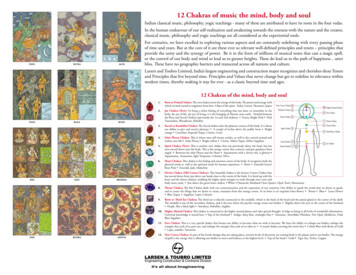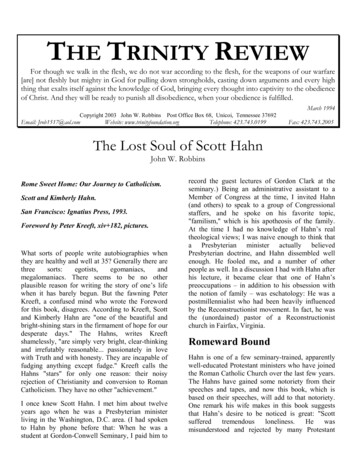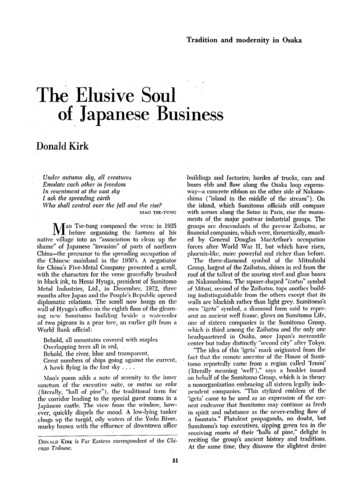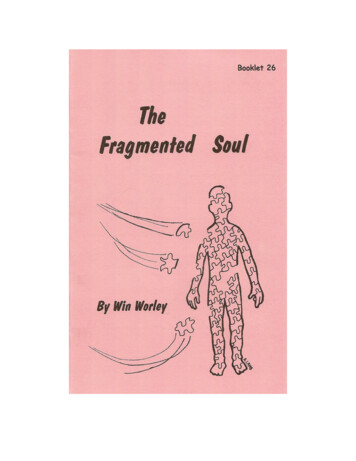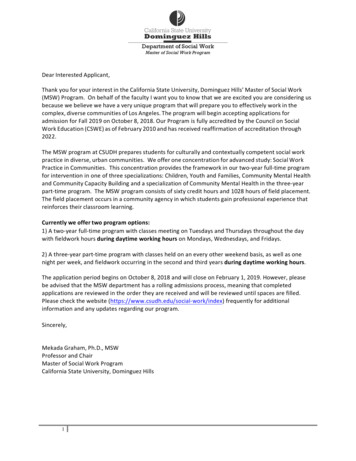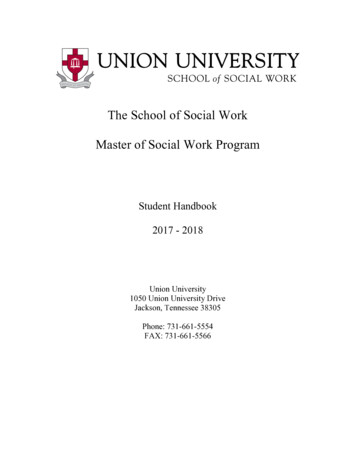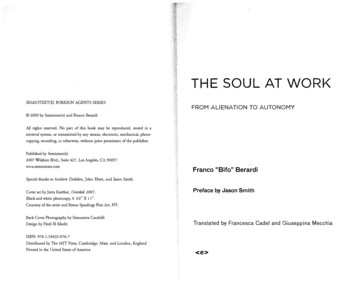
Transcription
THE SOUL AT WORKSEMIOTEXT(E) FOREIGN AGENTS SERIESFROM ALIENATION TO AUTONOMY 2009 by Semiotext(e) and Franco BerardiAll rights reserved. No part of this book may be reproduced, stored in aretrieval system, or transmitted by any means, electronic, mechanical, photo copying, recording,Ofotherwise, without prior permission of the publisher.Published by Semiotext(e)2007 Wilshite Blvd., Suite 427, Los Angeles,CA 90057www.semiotexte.comFranco "Bifo" BerardiSpecial thanks to Andrew Drabkin, John Ebert, and Jason Smith.Cover art by lutta Koerher,Untitled, 2007.Preface by Jason SmithBlack and white photocopy, 8 1/2" X 1 1 ".Courtesy of the artist and Reena Spaulings Fine Art, NY.Back Cover Photogtaphy by Simonetta CandolfiDesign by Hedi El KhoItiTranslated by Francesca Cadel and Giuseppina MecchiaISBN: 978- 1-58435-076-7Distributed by The MIT Ptess, Cambtidge, Mass. and London, EnglandPrinted in the United States ofAmerica e
ContentsPreface by Jason SmithIntroduction1. Labor and Alienation in the philosophy of the 1960s2. The Soul at Work92127743. The Poisoned Soul1064. The Precarious Soul184ConclusionNotes207223
PrefaceSoul on StrikeThe soul is the clinamen of the body. It is how it falls, and whatmakes it fall in with other bodies. The soul is its gravity. This ten dency for certain bodies to fall in with others is what constitutes aworld. The materialist tradition represented by Epicurus andLucretius proposed a worldless time in which bodies rain downthrough the plumbless void, straight down and side-by-side, untila sudden, unpredictable deviation or swerve-clinamen-leansbodies toward one another, so that they come together in a lastingway. The soul does not lie beneath the skin. It is the angle of thisswerve and what then holds these bodies together. It spaces bodies,rather than hiding within them; it is among them, their consistency,the affinity they have for one another. It is what they share in com mon: neither a form, nor some thing, but a rhythm, a certain wayof vibrating, a resonance. Frequency, tuning or tone.To speak of a soul at work is to move the center of gravity incontemporary debates about cognitive capitalism. The soul is notsimply the capacity for abstraction, for the subsumption of theparticular. It is an aesthetic organ as well, the exposure of thoughtto the contractions and dilations of space, to the quickening andlapsing of time. To say the soul is put to work is to affirm that thesocial brain or general intellect (to use two of Marx's phrases that 9\
have some currency in rhese debares) is nor rhe primary source ofpages from thevalue in rhe productJ.on process. Rather the soul as a web ofin the process of the valorization of capital: the impossible possi attachments and tastes, attractions and inclinations. The soul is ot simply the seat of intellectual operations, but the affective andbility that capital might circulate "without circulationinfinite velocity, such that the passage from one moment in thelibidinal forces that weave together a world: attentiveness, thecirculation of capital to the next would take place at the "speed ofability to address, care for and appeal to others. The contemporarythought." Such a capital would return to itself even before takingsubject of cognitive capitalism-Bifo speaks of the cognitariat, butleave of itself, passing through all of its phases in a processperhaps there are other names-is not simply a producer of know1-edge and a manager of symbols. Capitalism is the mobilization ofGrundrisse,Marx spoke of a tendency, a limit pointtime," at anencountering no obstacles, in an ideal time without time-in theblinding flash of an instant without duration, a cycle contractinga pathos and the organization of a mood; its subject, a field ofinto a point. No less an authority than Bill Gates restages this fan desire, a point of inflexion for an impersonal affect that circulatestasy-a limit point of capital, toward which it strains, itslike a rumor. The cognitariat carries a virus.vanishing point-in hisBusiness@the Speed o/Thought,cited byThe Soul at Work calls itself an experiment in "psychopathology,"Bifo as a contemporary formalization of this threshold, sum and it describes how something in the collective soul has seized up.moning the possibility of the circulation of information that would,The world has become heavy, thick, opaque, intransigent. A little,dark light shines through, though. Something opens up with thisGates fantasizes, OCCut as "quickly and naturally as thought in ahuman being."extinction of the possible. We no longer feel compelled to act, thatThere is speed and there is speed. It is not simply the phenom is, to be effective. Our passivity almost seems like a release, aenon of speed as such that plays the pathogenic role here. The socialrefusal, a de-activation of a system of possibles that are not ours.factoty is just as much governed by the destabilizing experience ofThe possible is seen for what it is: an imposition, smothering. Withchanges in rhythms,the eclipse of the possible, at the point zero of depressive lapse, weimposed on a workforce that is flexible, precarious and permanentlyare at times seized by our own potentiality: a potency that, noon-call-and equipped with the latest iPhone. This organizationIonof work, in which just-in-time production is ovetseen by a per in vectors of realization, washes back over us.Depressionspeeandccurs, Franco " Bifo" Berardi argues, when theplexity of the flows of information overwhelm thecapacities of the "social brain)) to manage these flows, inducing apanic that concludes, shortly thereafter, with a depressive plunge.Depression is so widespread today, Bifo argues, because the con temporary organization of production of surplus-value is foundedon the phenomenon-the accumulation-of speed. In well-known1 0 / Tile Soul at Workdifferences in speeds,whiplash-like reorientationsmanently temporary labor force, is mirrored in the form ofgovernance characteristic of democratic imperialism, sustained asit is by appeals to urgency, permanent mobilization, suspensions ofnorms: governance by crisis, rule by exception. It is impossible toseparate the spheres of the economy and the political these days. Ineach case, a managed disorder, the administration of chaos. Thesocial pacts and ptoductive truces of the old welfare states are gone.
Instability is now the order of the day. Disorder, a technique of1960s primarily took two forms. In the sphere of consumption,government. Depression starts to look less like a drying up of desirethere was the form of direct democracy known as "political"rhan a stubborn, if painful, libidinal slowdown or sabotage, apricing, in which neighborhoods and entire sections of cities uni demobilization. The soul on strike.laterally reduced the costs of goods and services such as housing,transportation and electricity, on the basis of a collective decisionto answer this question: How did we getthat refused any economic rationality in the determination offrom the particular forms of workers' struggle in the 1960s, char prices. At the point of production, the primary lever of antagonismacterized by widespread "estrangement" of workers from thewas the wage struggle, in which worker power was exercised in acapitalist organization of production, to the situation today, inrefusal to link wage levels to productivity, insisting the wage bewhich work has become the central locus of psychic and emotionaltreated as an "independent variable." The mutation represented byinvestment, even as this new libidinal economy induces an entirethe events of 1977, in which the logic of needs and antagonismrange of collective pathologies, from disorders of attention to newgives way to desite and flight, is whereforms of dyslexia, from sudden panics to mass depression? How, inbegins.other words, have we passed from the social antagonisms of thedefection from factory discipline, this unilateral withdrawal fromThe Soul at Work wantsThe Soul at Work reallyFor what is at stake in its story is the aftermath of this mass1960s and 1970s, when worker power was paradoxically defined bythe social pact drawn up by capital and its partners, the unions anda refusal of work, its autonomy from the capitalist valorizationthe worker parties, in view of "saving" the Italian economy after theprocess, and its own forms of organization-its defection fromwar. It asks: how has the sphere of desire, the field of the imaginaryfactory discipline-to the experience of the last two decades, whereand the affective, whose affirmation as the fundamental field of thework has become the core of our identity, no longer economicallypolitical once led to a collective abandonment of the sphere ofnecessary, yet vital to the constitution of the self? In short, fromwork, been transformed into the privileged force in the contempo fleeing work to identifyingrary ordet of work, the privileged moment in the production oft1.f .W Something happened in 1977.ifo hangs his story on thisvalue? Desire braids together emotional, linguistic, cognitive ande refusal of work reaches a feverimaginary energies that affirmed themselves against the regime ofpitch in the Italian autonomia movement, the year that the logic ofwork in the 1960s and 1970s, a refusal that is then paradoxicallyantagonism and worker neea -what Mario Tronti called theput to work by capital itself. This colonization of the soul and its"antagonistic will" of the proletariat-gives way to a logic ofdesire,desire-the entty of the soul itself into the production process in which social productivity can no longer be accounted for inspawns paradoxical effects. It transforms labor-power into whatstrictly economic categories, and in which the insurrectionarymanagerial theories call humanvectors no longer map onto the old imaginary of social war. Thework not an abstract, general force of labor, but the particularity,centrality of the category of worker needs in the struggles of thethe unique combination of psychic, cognitive and affective powersmutation. It's the year whencapital,harnessing and putting to
I bring to the labor process. Because thl's contemporary refor.fiions through the incitement of my specific creativel 1el powers, I expenence work as the segment of social lifein which I am mostfjree, most capableof realizing my deSlte' s.most myself; :: :::::::The Sou! at WOrk analyzesthe contemPorary d.ynaml'cs of caplt".' al mits"cogn1t1ve" ph ase using a.meth 0d It calls comp.ositionism. Th'ISterm lSused by B' ,1 0 to aVOl'd themisconceptionsinduced by the.use of operatsmo--work er'ls --:-todescribe the specifically Italiancurrent of Marxism.h e bot mh ents.and breaks Wlth. Thoughstrictly speakin the.h se f classlcaloperaismobeginsin1960sthe earlyand end Wlt t edlssolutlOn of the gRot e Operaio( ithin which Bifomilitated) in 1973 the,lar e eldCOltlOnlSt thought remains very active today, encom pas nerange f tendenciesrepresented by thinkers such as Paol V.lrno,Antonw Negri andM aur1Z" 10 L azzarato. Thistradition is founded.On three 1mb"ncated theoreticalbreakthroughs. the axI.Om assertingthe primacy of work 'er s struggles in thedevelopment of capita ,l theStudy of the chang'mg composition ofthe working class, asthe keyfor dec'ph1 enng'novel forms of po1"1t1caI organization andaction,and M' d" on ( . n the GrundriSSe) of the emergence of,the"generates a rorm 0 f work erpower that threatenstodestroy the bases for.0rgant.zmgProduction to extortsurplus-value.The fi rst concept requires that every analysis of the changm'gstructure of capital beunderstood not on.the basis of the lnternalcontradictions of capital itself. bUt as a Certa .in response to and'Useof., pro1etana n aggr'ession: worker insub.ordination alone ID1"tlatesrestructuration onthe part 0f caplta' J. This response.inwhich theorganlc compositio'n of capital-theratio of fixed to variable; .: : :: . : ::"%. ; :capital-undergoes a mutation, induces a recomposltlOn of theinternal consistency of the working class. This axiom of the prior ity of worker refusal required, in turn, the development of aphenomenology of proletarian experience. This phenomenologydescribed the changing internal composition of the various layersof the working class, identifYing emerging strata that would assumea dominant role in the immediate process of production: for exam ple, the increasing importance of the mass worker in the Fordistfactory, after the hegemony of the skilled worker of earlier socialcompositions. On the basis of this analysis of the different strata ofthe working class, novel political forms of organization andaction-beyond the Leninist party and its revolutionary straregy adequate to this composition. Finally, the thesis on the "generalintellect," in which Marx sees the use of automation in the pro duction process reaching a moment when labor-time can no longerbe posited as the measure of value, implies both of the precedingconcepts: the move to an increasingly automated system of pro duction is seen as a response to worker struggles atound theworking day, while the positing of the intellect and knowledge as aproductive force implies a change within the composition of theworking class, with certain sectors (in Bifo's analysis, the cognitari at) emerging as the paradigmatic form of labor. Insofar as themethod of class composition is undertaken in view of seeking outnovel openings in the social war-its elevation to another level ofcomplexity and intensity-the specter of a labor process increas ingly founded on the production and management of knowledgeinitiated, an erosion of the classical division of labor and its cor responding organizational diagrams. Placing pressure on Marx'sanalysis of the general intellect allowed the militants of thecompositionist tradition to diagram a series of mutations in the1 4 I The Soul atWorkPreface: Soul on Strike / 1 5
dynamics of contemporary class antagonism.The collapse of thedistinction between conce
To speak of a soul at work is to move the center of gravity in contemporary debates about cognitive capitalism. The soul is not simply the capacity for abstraction

